Meg Sefton's Blog, page 13
April 11, 2022
Easter War
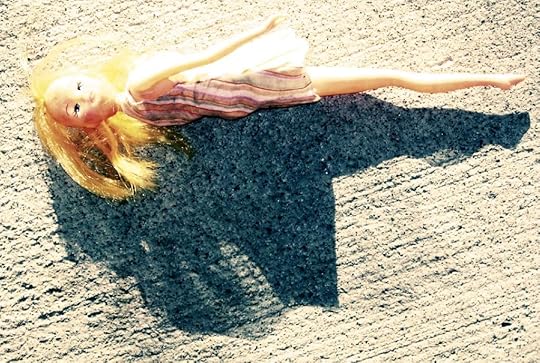 “acidic barbie” by Charolotte Kinzie, flickr
“acidic barbie” by Charolotte Kinzie, flickr
At night, in our home, which no longer consists of bedrooms or Mother or my baby sister, my father and I pursue our projects under skies exploding with bright red peonies of fire, with distant yellow daffodils of searing heat and air-splitting rage. We have a roof, still, though it covers only one small room, the only thing sheltering us after the initial pass of bombs, soldiers, and tanks. Miraculously, we have survived. Miraculously, so have others. And we go about on the streets drenched with waters that have quenched aggressions. The bomb sirens have replaced our call to matins, and we wait, with the others, and do what we are able.
We have stayed behind to serve the people and I was not unlike many other older girls who stay behind to help fathers and brothers. My father had been a Protestant minister to a small congregation, but now he performs last rites in the style of whatever faith his townspeople require. My brother and I and Olek, a boy who has stayed behind to fight, have worked to create Easter for the other child soldiers. Olek is a master at carving and so we carve and paint eggs, we make Easter baskets. Most of the young children have fled with their mothers, but older children and teenagers—boys and girls—are here and have been trained in the use of weapons and how to hide and how to find cover.
It has been an age since I lived in Appalachia. I can scarce recall it. My life here blends with our past life there and sometimes they feel interchangeable, and in some ways, they are, especially now. My grandma always called it “hardscrabble.” She is the one who taught me to make things from twigs and branches and sticks. Grandma and I used to put grapevine in the creek under large outcroppings of rock. We would leave it there to soak. In a day or two’s time, the grapevine would be ready for weaving—into baskets, wreaths, pumpkins, suet feeders, lampshades, stars, peace symbols. We sold our wares to tourists.
My grandmother used to say that at a certain age, what a woman needed was baskets, places to contain all the pieces of life, that sorting and ordering were half the battle. So much has been lost to us that I would love to have more to contain. But a basket would not have held my father’s grief, so lost did he look on those first nights after Mother’s death, my beautiful mother he met during a seminary trip to Eastern Europe. Out of their marriage had come me, Daniela; Krystiyan, my younger brother; and my baby sister Katya.
After my father had blessed and cleansed my mother and sister with holy water, he wrapped them in the best linens we could find. He also consecrated our yard where Olek, my brother Krystiyan, and I dug a grave. The bomb that struck one side of the house had made short work of it and so the earth was soft, plowed as it were, and deeply pitted. We laid them in the yard, marked by crosses, a larger one for Mother and a smaller one for Katya.
Father said there wasn’t time to mourn. There were many who needed the comforts of ministrations of prayer and holy water, even if the ministering was over rubble and memorials bereft of remains. The injured, the mourning, and those huddled in shelters needed prayer and food. Every night, Olek carved eggs to give to families with children. Krystiyan, the artist of our clan, painted them with brushes and paints he kept in his rumpled jacket and pants pocket. We took wood from decimated buildings and schools. I took various fibers and plastics for baskets. During the day, we manned our positions with guns, though we sometimes encountered enemy soldiers lying down in the street in surrender in exchange for water and a crust of bread.
My father became convinced the soil soaked with blood that was already drenched in blood would always require light to redeem the people and so he made light in the way he loved everyone. He became light and danced on air. He remembered all names, even those of the enemy who in fatigue and confusion sought creature comforts. He spoke the dreams and fears of his adopted flock so they felt known. Before he died, I came to realize what I had seen, known, and felt.
When the war was over, I would go back to Appalachia. When the war was over, I would put my hands in the cold stream and feel my grandma’s hands on the back of mine, hear her soft instructions to hold the grapevine down in places where it could soften.
April 9, 2022
Flights of Foundry

March 27, 2022
The Great Easter Un-Ready
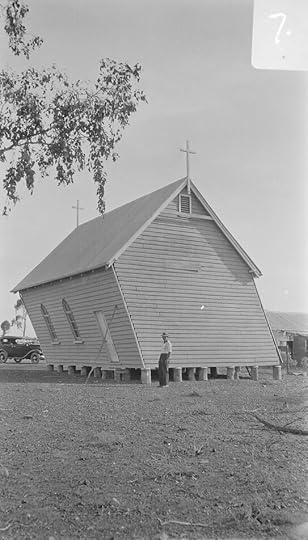 St. George’s Anglican Church, Lightning Ridge, 1933, after cyclone, flickr
St. George’s Anglican Church, Lightning Ridge, 1933, after cyclone, flickrYou’re not sure you’re ready for this yet.
The Church is one foundation is Jesus Christ our Lord. She is his new creation by water and the Word.
Fifteen minutes late, sneak in through the back. Hardly anyone there. Everyone socially-distanced. Few under sixty.
Do not be like horse or mule, which have no understanding who must be fitted with brit and bridle, or else they will not stay near you.
Don’t forget to bow during the Nicene Creed, curtsy and bow before going to the altar, cross yourself at the mention of the Lord.
When you were little and your father a pastor in another denomination, you rolled up the bulletin and pretended to smoke. No telling what you will get when you adopt said one of your in-laws to your mother once. When you were little that time you smoked, you purposefully sat down when everyone stood up, stood up when everyone sat down.
Great are the tribulations of the wicked; but mercy embraces those who trust in the Lord.
Spankings on the butt in your room.
Today, they are welcoming during the service and give you a gift bag for being new. Hopefully, they have not noticed all your blunders including how late you were. You are rusty and full of excuses. You were not born into it, this faith. No, but you came damaged.
Are you smiling enough? You hope so. And you are so nervous, you have to be reminded of your jacket and gift bag you left on the pew. What does the woman with the diamonds on her neck think of you, the one who says you left “your brain” on the pew? She speaks of her heroics as a hard-working and faithful youth minister’s wife. Later you will remember the damage on the back of your car gave you no chance. If anyone saw you drive away. Drive away fast and quickly. From invitations to stay, stay for Sunday school. But they were friendly. Of course.
And the pastor who with authority and grace spoke of the prodigal was beautiful. But later, a woman of the landed gentry (we used to hunt in your area of town) spoke of a member who had a previous life in a “gang,” a member who is definitely the “prodigal” if ever there was one. You’re not ready for this. Jesus loves you too, lady.
On your way home, you admit Jesus, Mother Mary of God, does my father love dictators now? Remembering his stance on the rights of special groups in town, his run out of town on a rail, his run out of his church. The gossip, the pain. Feeling both defensive for him, but regretful. You are scared to ask him what he believes in his new iteration of a life, retired.
You’re not sure you’re ready for this yet. Why did you take off your Easter hat in church? It was all fixed and everyone could see your bobby pins. Mother, again, angry. Punishments. Silence.
You were married in your father’s church. When you returned, divorced, their stares on you.
For your hand was heavy upon me, day and night; my moisture was dried up as in the heat of summer.
Mother abusive when father away. But only verbally so when present.
Happy families from the altar. Happy families in church.
Great are the tribulations of the wicked: but mercy embraces those who trust the Lord.
March 18, 2022
St. Patty’s at The Women’s Center
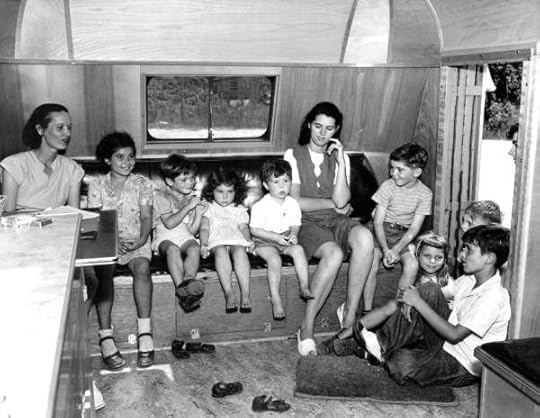 Waiting room, Duval County dental trailer, Mayport, FL, July 15, 1947, flickr
Waiting room, Duval County dental trailer, Mayport, FL, July 15, 1947, flickrElora had been dreading her follow-up to the ultrasound of her neck. Several years ago, her neck had been the site of an invading cancer. Her surgeon had performed a miracle surgery of her thyroid, leaving only a faint line, as if it were a midlife wrinkle.
The Women’s Center was a new experience: near downtown, luxuriously appointed, a good place to receive any news—for good or ill. Even the phlebotomist’s office would have been a desirable place to linger with a coffee and a good book. The ceiling was vaulted, the windows immense, the light pristine.
She had made a good acquaintance with the receptionist and the nurse, a good practice in her experience. Today she was surprised to see a patient out of sorts. The elder lady was impatient within five-minutes’ waiting, scooting to the front on her walker to demand how much time is “a little while?” Fifteen minutes? Thirty minutes? Most of the waiters assumed their stay would be however long, but Elora recognized something in it—the sense of powerlessness, the loss of control, the invisibility. The woman wore a knitted beanie of white and green shamrocks for St. Patty’s. Elora had complimented the woman for her hat when she was received into the waiting room but was unable to discern the response.
Elora sat, waiting. She worried. She hadn’t been sure she would come in today. She hadn’t slept well for a week, ever since the ultrasound technician hovered long seconds over certain areas of her neck, the pressing yielding a dull ache. She had to have her wits about her to navigate the traffic, but she finally fell asleep for two hours before leaving home. It was enough.
Only a month ago, her new doctor had been a pristine presentation of professionalism yet sympathy, that unique combination that was so reassuring. A petite Hispanic woman, she had been as flawless in her appearance as in her manner—beautifully dressed and coiffed. Although she was far along in her pregnancy, her protruding belly fit her slight, feminine frame.
Things had changed in just a month. For them both. Elora was actually worried. And not for herself. There was a graying at her doctor’s temple, a dishevelment in her overall appearance, a weariness in her eyes. She was closing things down with her patients while she readied herself for her coming hiatus. And she was struggling with her three-year-old. Do you have children? she said, though as much for a sense of camaraderie as a question.
Together, they looked at the film of her neck, at what nodes seemed normal and which ones may be suspicious. The radiologist had not rendered an opinion, so these were only speculations her doctor said. The wisest doctors Elora had ever had brought her along at certain stages, letting her see numbers and tests and reasoning through them with her, as if she had the powers of medical discernment.
Outside, and on the way home, she thought: It was like looking at the craters on the moon, those pictures of the inside of my neck. And, she thought: How can I send my doctor a baby gift? And then she imagined what a challenge it was for her doctor to balance what she did so well professionally with what was so unknown and unchartered for any woman at home with children. And at night, laying on her pillow, there were familiar tears of fright, an old friend now, but just a few tears she indulged: I don’t want to die. Followed quickly by another thought: Until informed otherwise, results are still inconclusive. And with this, she fell asleep.
March 8, 2022
Max Richter, Prayers for Kyiv
March 7, 2022
Slapface
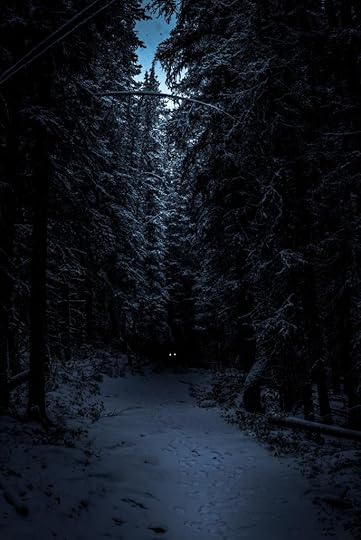 Photo by Neil Rosenstech on Unsplash
Photo by Neil Rosenstech on UnsplashHave you seen the movie Slapface? A teenage boy and his younger brother struggle to survive after the death of their mother. The father is absent, but apparently, he was an abusive alcoholic. The boy hangs out alone in the woods, though sometimes he is joined by a pack of three girls who bully him. He forms a special bond with one but even though they have a special relationship, the girl joins the other two in bullying him when they are all together.
The boy meets a monster when he is hanging out in an abandoned building. It is a tall shadowy figure with draped clothing, a gaunt face, a hooked nose. Although the boy thinks at first that the monster might be attacking him, he realizes that this may not be the case. In fact, they enjoy many quiet, mysterious moments together, just hanging out, quite a contrast from the more raucous moments he has with his brother who abuses him in games of “slapface.”
There were times I was wondering if the monster was supposed to be a kind of mother figure, or even a father figure. The boy starts to love the monster and want to know him. Yet, the monster could also be violent, sometimes chaotically so. However, it is notable that the monster does not hurt the boy. And sometimes, he hurts others in an effort to protect the boy or fight for him.
Nothing becomes clear about the monster, only that his ambivalent nature means the boy cannot continue their friendship. The boy grows into an understanding of violence and abuse and its limitations in a relationship. He matures and separates. Perhaps the monster is only the conflicted feelings in the boy as well as his dire need of maternal love and presence.
It is a beautiful and mysterious movie. I like it that much was left unexplained. I loved it.
March 4, 2022
Touching Like Candy from a Baby
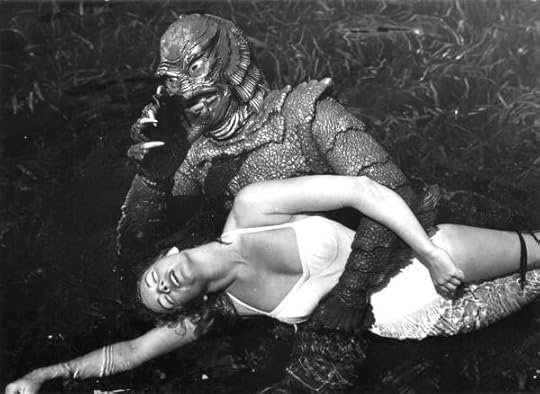
Ginger Stanley in the grip of the Creature, Silver Springs, Florida Memory, state archives
I did something this week I never imagined myself doing. I touched a man I didn’t know. It happened in the theater, and I shouldn’t have allowed myself to do it. But I haven’t touched a man in four years. Maybe it was like going to the grocery store hungry.
He was a big man, not totally my type, and he seemed intensely clued in on his food. But he was the only man in the whole dark room. Don’t get me wrong, I like them tall and beefy, but he was a bit extra horizontally. Still, he seemed kind of innocent, unfazed, just out for a flick.
I got brave when we started laughing at the same things, the same stupid ads and previews. I tried to laugh as loud as he laughed, louder, so he might turn to see me. He didn’t. He was engrossed in his system of consumption. He had a huge popcorn to his left, a box of candy in his lap, and a tub of soda to his right.
When the dark, atmospheric film began and the actors in period costumes started wandering fields with torches, I moved a seat closer to him. (We were seated on the same row, at opposite ends.) He never looked up, never registered any sign of his surroundings.
By the time the slimy, hungry monster on the screen was moving in on the human kill, I was sitting midway in the theater. Only a few more chairs to go. I marveled that the man kept eating with no breaks.
I waited until dark scenes engulfed the theatre to move closer to him. The only lights showing were the exit signs and track lights on the stairs.
When we were sitting elbow to elbow, he looked over at me and smiled. I took this as ascent and so I took his popcorn and fed it into his mouth while we watched the show together.
I felt his soft lips slobber on my fingers. I felt his tongue.
That was all I wanted.
When the credits rolled, he took his empty food boxes. He didn’t thank me or ask me my name. He didn’t acknowledge me. It was as if I were part of the theater, like the workers who tore tickets and swept up popcorn.
I wonder if I see him again if we might hug. I wonder if he might allow that.
Maybe I had been too hasty in breaking up with my Greek, my steady from before the pandemic. But what’s a lady to do? And how much can one take? Men don’t know what they need, what they want, what’s good for them. We ladies have to show them, and risk not getting so much as a thank you and kindness for our service.
My Greek had started neglecting me. Maybe I should have allowed it.
Bell Bottom Blues
March 1, 2022
Fountain
 Google Deep Dream: Locust Bloom by Deborah Lee Soltesz, flickr
Google Deep Dream: Locust Bloom by Deborah Lee Soltesz, flickr
My stories and writings are often in flux, so if you see anything that could use a tweak, drop a comment. Many thanks. Even though “Women in Horror” month is officially over, I’m thinking I will continue on.
—Margaret
Ula hadn’t always lived in one of the apartments facing the huge fountain. She used to live in a garden apartment facing the parking lot. Down the breezeway when she left for errands, she could hear the sound of falling water so loud and shattering, she began coveting the apartments facing a sound that would block all others, a sight of such beauty. Egrets walked along in the grass beside it and duck families swam in the little waves in spring. When her apartment lease was up for renewal, the office told her they had the availability she had been begging God for, so deeply had she been seeking the sound of the tumbling waters, to live next to it and bask in it, to sit out on her patio at night and enjoy it under the moonlight.
The first few nights, she opened her windows so she could hear the fountain, feel invaded by it. Delightedly, she watched reflections of the waves it created along her ceiling and walls. It was as if she had her own living wallpaper. It was the most beautiful decoration she had ever had and she decided to store her framed art and glicees, some of them quite large, so that nothing should interfere with the water’s reflected beauty. This was an aspect of the new residence she hadn’t anticipated and each night after having dinner on her porch and watching the live show of the lake’s light upon the fountain, the moon glowing its approval, she lay in bed and enjoyed a different show, this shimmering ephemera, as beautiful as the sun shining through the crystals of a chandelier.
She had almost forgotten her means of making an income. Well, almost. When it was time to shop for groceries, she realized she had become so distracted by her new home, she had neglected to solicit clients.
“How are you?” she blind texted several of them at once. They would know what that meant. Several arranged for a meeting and so she knew it wouldn’t be long before she could be assured of meeting the rent.
It was something she had promised God she would give up if only she were living next to the fountain. She would find a more respectable way of earning bank, but she was getting a little older and the last legal job she had which required her to be in an office was over several years before the pandemic. Yet she was still beautiful enough to charge a higher rate to meet her needs.
She apologized to God and arranged for her first monger, the first in months.
She was thankful it was Anders, harmless enough. He stood at her doorway and the reflected light of the fountain fell along his face as if he were a sailor lured by a water nymph. He did not treat her poorly by comparison with the others who believed themselves artists and their paid providers objects. She had come to welcome his strawberry blond hair, fair skin, slow smile.
Deep in the night, the fountain woke her. “Come to me,” it said and she stepped out into the breezeway and walked down the hall, leaving Anders sleeping peacefully in her bed. The slight wind off the water lifted her hair and satin robe. No one was awake and so she let it fall open, revealing her chemise underneath. At the water’s edge, there were droplets in the air and she closed her eyes. To be lost in that beauty and cascade of sound! To never have to worry, or scrap, or struggle again!
“Ula?” said a male voice behind her. Anders. “Are you alright? The door was open.”
“Yes,” she said, turning and extending her hand to him, inviting him to join her.
“Um, ok.”
He had on a Dodgers ringer tee. With his light curly hair, he looked like a boy, a very tall boy, but a boy nonetheless. Why had he not found some woman to settle down with? Or did he have someone? This latter scenario was something Ula had all too frequently experienced.
“Close your eyes,” she said. “Tell me what you feel, hear.”
They held hands and he obediently closed his eyes.
“Do you hear it?” She said.
“I hear a lot of water.”
“Do you feel it? It’s like an energy, a living presence. Maybe if we stepped a little closer…”
“What?”
“Just a little.”
“Well, ok.” And he took another couple of steps with her so that their feet were submerged. It wasn’t unpleasant. It was a hot, humid Florida night and Ula had counted on Anders to help pay the power bill to get her air on.
She closed her eyes and held his hand on her chest.
“Ok, this is nice,” he said. “A little crazy, but there are some perks.”
The fountain grew louder in her ears, suddenly deafening, a murderous kind of deafening, the kind of loud rage she experienced when her father used to loom over her with the white belt with the silver rings, the buckle that could raise up blood. Except now the fountain’s rage was her rage.
With a shocking power, she twisted Anders’s arm so that he fell into the lake. He twisted away and attempted to strike her but she managed to mount his back and hold his torso between her thighs, choking him with her arms until his every breath was an intake of water.
“I’m sorry,” she told God the next day as she was making coffee. Soon, the body would be discovered and then the apartment dwellers would be questioned. The thrumming, cascading sound of the water invaded her consciousness so that no other thought was possible. So long had she lived with guilt over her misdeeds and acts of neglect, not the least of which was her aged mother, yearning for a visit, fragments of her mind atrophied with dementia. The sound of the water, which she welcomed with open windows and an open patio door washed her mind, cleansed her thoughts, and later made it possible for her to behave appropriately when detectives visited her. She was not nervous or fidgety, but appropriately upset and concerned over the dead john.
No accusation or even suspicion befell her and one of the detectives became a client. He eventually helped her with webcamming so she could have a different mode of operation. The fountain continued to teach her what to say, how to act. She married the detective and he retired and moved in with her. They went into business and built their nest egg. Her mother died, her last thought a memory of the yellow bow she had made for a little girl a long time ago, a yellow bow for the girl’s auburn hair.
She no longer spoke to God.
February 23, 2022
Women In Horror (Sexism, Feminism & Male Preference in the Horror Genre Every Month)
As a horror and dark fiction writer, I am frequently confronted by the issues discussed here. I thought I would share this excellent article and point you to an interesting blog on this Wednesday. I hope you are doing well! Most sincerely—Margaret
 Zombie Salmon (the Horror Continues)
Zombie Salmon (the Horror Continues)
(A late Women-In-Horror Month posting with apologies to regular readers: my computer died and took my originally planned post with it. This is a reconstruct… from the best of my failing memory…)
Here in the climate of #MeToo, female writers of Horror do not have far too look for a sad sisterhood.
How quickly must I apologize to male readers of this blog? How deeply must I sublimate the resentments that still haunt every writing decision I make like so many Leng Hounds?
This is how we know there is a problem: “No offense to male writers of the genre, but…”
Because here we are not talking about a casting couch. (Perhaps those of us who are writers of fiction too often seem unsexy in our sweat pants and pinned up hair, locked for long periods of time like mental patients in our writing rooms, we only “glam up” on…
View original post 4,010 more words
Meg Sefton's Blog
- Meg Sefton's profile
- 17 followers



